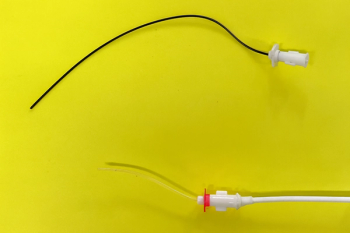
Just Ask the Expert: How do you handle proteinuria?
Protein can show up on a routine urinalysis for a variety of reasons.
Dr. Garcia welcomes internal medicine questions from veterinarians and veterinary technicians.
What are some of the common causes of canine proteinuria, how do you diagnose glomerular disease, and what are some common treatment options?
Protein can show up on a routine urinalysis for a variety of reasons. Typically, prerenal and postrenal causes can be easily ruled out by looking at the results of a serum chemistry profile and urine sediment examination. Once prerenal and postrenal causes have been ruled out, measuring a urine protein-creatinine ratio (UPCR) can provide a more quantitative assessment of renal proteinuria.
Jennifer L. Garcia, DVM, DACVIM
A UPCR of < 0.4 is considered normal. The most current recommendations suggest that if the UPCR is < 2 and the patient is nonazotemic and stable, you can recheck the UPCR in two weeks to document persistence or look for further elevation. If the patient is azotemic, however, and the UPCR is > 0.5, further workup and intervention are recommended.1
In general, medical intervention for patients with renal proteinuria, or glomerulonephritis, consists of a diet change (ideally to a renal diet) and treatment with omega-3 fatty acid supplements and an ACE inhibitor.2,3 ACE inhibitors decrease transcapillary pressure within the glomerulus and decrease protein loss. You may choose to use benazepril instead of enalapril in patients that are already azotemic, but either drug can be well-tolerated. The starting dosage for both drugs is 0.5 mg/kg given orally once a day. Dosing may be increased to twice a day if no improvement is noted in the UPCR after four weeks. Monitoring of the renal parameters is indicated to look for any worsening azotemia that may arise either from drug therapy or progression of renal disease.
Once glomerulonephritis is diagnosed, it is important to look for an inciting cause. Finding and addressing an underlying illness will help decrease further glomerular damage, but the inciting cause may not be obvious or may no longer be present. Any chronic underlying antigenic stimulus can result in damage to the glomeruli over time (e.g. infectious disease, immune-mediated disease, neoplasia). Even seemingly benign problems such as chronic gingivitis or stomatitis or skin disorders should be addressed.4
Hypertension is a common complication in patients with glomerular disease and, if left untreated, can hasten the progression of renal damage. ACE inhibitors alone tend to be ineffective at controlling hypertension, so in those patients with systolic blood pressure > 170 mm Hg, amlodipine is often added to the treatment regimen.
Jennifer L. Garcia, DVM, DACVIM, is a veterinary internal medicine consultant in Houston, Texas.
REFERENCES
1. Littman MP, Goldstein RE, Labato MA, et al. ACVIM small animal consensus statement on Lyme disease in dogs: diagnosis, treatment, and prevention. J Vet Intern Med 2006;20(2):422-434.
2.Grauer GF, Greco DS, Getzy DM, et al. Effects of enalapril versus placebo as a treatment for canine idiopathic glomerulonephritis. J Vet Intern Med 2000;14(5):526-533.
3. Brown SA, Brown CA, Crowell WA, et al. Beneficial effects of chronic administration of dietary omega-3 polyunsaturated fatty acids in dogs with renal insufficiency. J Lab Clin Med 1998;131(5):447-455.
4. Ettinger SJ, Feldman EC. Glomerular diseases. Textbook of veterinary internal medicine. 7th ed. Philadelphia, Pa: Saunders, 2010.
Newsletter
From exam room tips to practice management insights, get trusted veterinary news delivered straight to your inbox—subscribe to dvm360.




